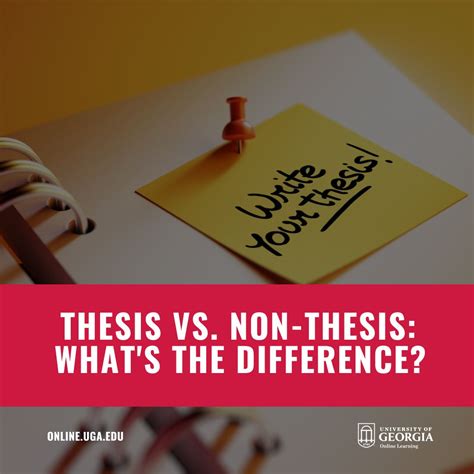Introduction
Pursuing a master’s degree is a significant academic milestone, and candidates often face a crucial decision: to embark on a thesis or non-thesis track. While both paths lead to a master’s degree, they differ significantly in their nature and requirements. This article delves into the key distinctions between master’s thesis and non-thesis options, empowering candidates to make informed decisions that align with their goals and aspirations.

What is a Master’s Thesis?
A master’s thesis is an original research project that culminates in a substantial written document. Thesis-based master’s programs typically require students to:
- Formulate a research question or hypothesis
- Conduct extensive literature reviews
- Design and execute research methodologies
- Analyze and interpret data
- Draw conclusions and defend their findings
Master’s theses are rigorous academic endeavors that demonstrate a student’s ability to conduct independent research, solve complex problems, and communicate their findings effectively.
What is a Non-Thesis Master’s Degree?
Non-thesis master’s programs emphasize coursework and professional development rather than original research. Instead of a thesis, candidates complete a set of prescribed courses and may engage in practical experiences such as:
- Internships
- Practicums
- Capstone projects
Non-thesis programs are designed to provide students with the knowledge and skills necessary for immediate application in their chosen field.
Master’s Thesis vs. Non-Thesis: Key Differences
To help clarify the distinctions between these two paths, the following table summarizes their key characteristics:
| Characteristic | Master’s Thesis | Non-Thesis |
|---|---|---|
| Research Focus | Original research project | Coursework-based |
| Timeframe | Typically 2-3 years | Typically 1.5-2 years |
| Resource Commitment | Extensive time and effort | Lower time and effort commitment |
| Academic Rigor | High | Moderate |
| Career Path | Academia, research-oriented roles | Professional practice, industry-focused roles |
Factors to Consider When Choosing a Path
The decision between a master’s thesis and non-thesis track depends on several factors, including:
- Career Goals: If you aspire to a career in academia or research, a thesis track may be more suitable. For those seeking industry-focused roles, a non-thesis path may suffice.
- Time and Resources: Thesis tracks require a significant time commitment and may demand additional resources, such as research equipment or travel expenses. Non-thesis programs typically offer more flexibility and require less investment.
- Research Interests: If you have a strong desire to pursue original research and make a contribution to your field, a thesis track is a better fit. Non-thesis programs may not provide ample opportunities for independent research.
- Learning Style: Thesis tracks foster independent learning and research skills, while non-thesis programs prioritize applied learning and industry-relevant knowledge. Choose the path that aligns with your learning preferences.
Benefits of a Master’s Thesis
- Research Skills: Develops advanced research design, data analysis, and interpretation abilities.
- Independent Learning: Fosters self-directed learning, critical thinking, and problem-solving skills.
- Career Advantage: A thesis can demonstrate research proficiency and enhance job prospects, particularly in academia or research-oriented roles.
- Personal Growth: Challenges students intellectually and encourages them to step outside their comfort zones.
- Intellectual Curiosity: Satisfies the desire to delve deeply into a particular topic and contribute to the advancement of knowledge.
Benefits of a Non-Thesis Master’s Degree
- Career Focus: Provides the knowledge and skills necessary for immediate entry into the workforce.
- Time-Saving: Completes in a shorter timeframe, allowing for earlier career advancement.
- Cost-Effective: Generally requires lower tuition and fees compared to thesis programs.
- Practical Experience: Offers opportunities for internships, practicums, and capstone projects that provide real-world experience.
- Career Networking: Connects students with industry professionals and potential employers.
Tips for Choosing the Right Path
- Consult with Advisors: Discuss your career goals, research interests, and resource constraints with academic advisors and mentors.
- Explore Program Options: Research different master’s programs to find one that aligns with your needs and aspirations.
- Weigh the Pros and Cons: Carefully consider the benefits and limitations of both thesis and non-thesis paths.
- Consider Your Timeframe: Factor in the time commitment and resource requirements of each path.
- Seek External Perspectives: Consult with industry professionals, classmates, or alumni to gain insights into the advantages of each option.
Conclusion
The decision between a master’s thesis and non-thesis track is a significant one that requires careful consideration. By understanding the key differences and benefits of each path, candidates can make informed choices that align with their academic and professional aspirations. Whether pursuing original research or seeking immediate industry entry, both paths can lead to successful careers.
Additional Resources
- Master’s Degree vs. Master’s Thesis: What’s the Difference?
- Thesis vs. Non-Thesis Master’s: Which One Is Right for You?
- Master’s Thesis vs. Non-Thesis: Which Option Is Best for You?
